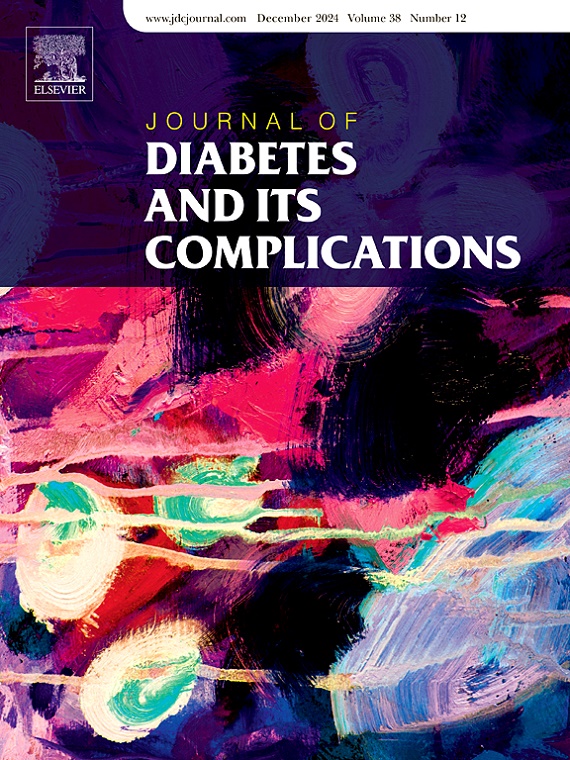无糖尿病手术患者的剑桥风险评分、新发高血糖和并发症。
IF 2.9
3区 医学
Q3 ENDOCRINOLOGY & METABOLISM
引用次数: 0
摘要
目的:我们的研究探讨了择期手术患者的剑桥风险评分(CRS)、新发高血糖(NH)和并发症之间的关系。方法:采用回顾性横断面研究方法,选取无糖尿病的成人手术患者,确定NH(血糖≥140 mg/dL),计算CRS。我们使用单变量回归模型来评估CRS和NH与30天再入院、住院时间(LOS)和并发症之间的关系。模型按外科专科(心脏/血管、普通、骨科、神经)分层。结果:在研究的10531例患者中,24%患有NH。调整协变量后,CRS与并发症发生率增加相关[OR 2.09;95%CI:1.69, 2.59]和NH [OR 1.95;95%置信区间:1.66,2.29)。NH与30天再入院几率增加有关[β 1.60;95%CI:1.31, 1.96],且LOS升高[β 0.64;95%置信区间:0.59,0.68)。当按手术类型分层时,CRS与神经外科的LOS增加,骨科的LOS降低,神经外科和骨科的并发症和NH的发生率增加有关。结论:择期神经外科、骨科和普外科患者的CRS与NH、并发症和LOS相关。这表明CRS可能有助于识别NH和并发症高风险的手术患者。本文章由计算机程序翻译,如有差异,请以英文原文为准。
Cambridge risk score, new hyperglycemia, and complications in surgical patients without diabetes
Aims
Our study examined the association between the Cambridge Risk Score (CRS), new hyperglycemia (NH), and complications in patients undergoing elective surgery.
Methods
In this retrospective cross-sectional study, adult surgical patients, without diabetes, with NH (blood glucose ≥140 mg/dL) were identified, and the CRS was calculated. We used univariate regression models to evaluate the relationship between CRS and NH with 30-day readmission, length of stay (LOS), and complications. Models were stratified by surgical specialty (cardiac/vascular, general, orthopedic, neurologic).
Results
Of 10,531 patients in the study, 24 % had NH. After adjusting for covariates, the CRS was associated with increased odds of complications [OR 2.09; 95%CI:1.69, 2.59] and NH [OR 1.95; 95%CI:1.66, 2.29]. NH was associated with increased odds of 30-day readmission [β 1.60; 95%CI:1.31, 1.96], and increased LOS [β 0.64; 95%CI:0.59, 0.68]. When stratified by surgery type, the CRS was associated with increased LOS in neurosurgery, decreased LOS in orthopedics, and increased odds of complications and NH in neurosurgery and orthopedics.
Conclusion
The CRS is associated with NH, complications, and LOS in patients undergoing elective neurosurgery, orthopedic surgery, and general surgery. This suggests that CRS may have potential to help identify surgical patients at high risk for NH and complications.
求助全文
通过发布文献求助,成功后即可免费获取论文全文。
去求助
来源期刊

Journal of diabetes and its complications
医学-内分泌学与代谢
CiteScore
5.90
自引率
3.30%
发文量
153
审稿时长
16 days
期刊介绍:
Journal of Diabetes and Its Complications (JDC) is a journal for health care practitioners and researchers, that publishes original research about the pathogenesis, diagnosis and management of diabetes mellitus and its complications. JDC also publishes articles on physiological and molecular aspects of glucose homeostasis.
The primary purpose of JDC is to act as a source of information usable by diabetes practitioners and researchers to increase their knowledge about mechanisms of diabetes and complications development, and promote better management of people with diabetes who are at risk for those complications.
Manuscripts submitted to JDC can report any aspect of basic, translational or clinical research as well as epidemiology. Topics can range broadly from early prediabetes to late-stage complicated diabetes. Topics relevant to basic/translational reports include pancreatic islet dysfunction and insulin resistance, altered adipose tissue function in diabetes, altered neuronal control of glucose homeostasis and mechanisms of drug action. Topics relevant to diabetic complications include diabetic retinopathy, neuropathy and nephropathy; peripheral vascular disease and coronary heart disease; gastrointestinal disorders, renal failure and impotence; and hypertension and hyperlipidemia.
 求助内容:
求助内容: 应助结果提醒方式:
应助结果提醒方式:


